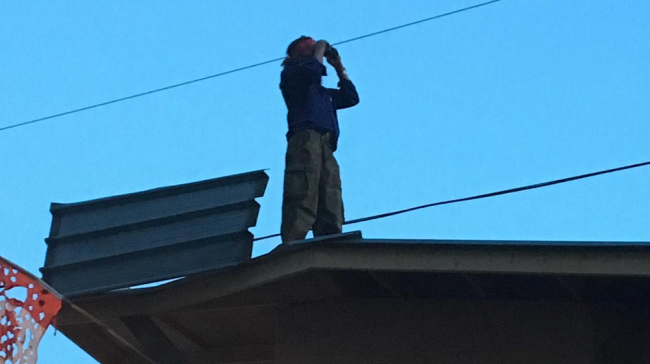As the City of Burnaby’s 72-hour eviction notice expires, an elder shares a teaching while around 30 water protectors listen intently, some of them sipping their steaming cups of morning coffee.
Moments later George Manuel, son of the late National Indian Brotherhood and Secwepemc Chief George Manuel, shares a song.
Although there’s uncertainty over whether authorities will enforce the city’s eviction notice, water protectors are calm and focused.
Over the past three days, they’ve repeatedly pledged to stand their ground and continue their fight against the Trans Mountain pipeline expansion project.
Several of them are from various Coast Salish nations. Burnaby Mountain itself has been used for thousands of years by the Musqueam, Squamish, Kwikwetlem and Tsleil-Waututh.
Kwitsel Tatel is Stó:lõ, and Camp Cloud’s court monitor.
She tells passersby who stop to speak with her that the Trans Mountain pipeline and Burnaby marine station are on “unceded Coast Salish territory,” and that the City of Burnaby does not have jurisdiction to evict Indigenous people who are standing on lands they never surrendered to Canada.
Burnaby’s eviction notice was delivered at 6 a.m. on Wednesday and cites building and zoning bylaw infractions.
Responding in an open letter on Sunday Camp Cloud published an open letter to the city saying Burnaby “cannot, in good faith, move forward with enforcement of bylaws on Camp Cloud without enforcing the same on Kinder Morgan.
“Your eviction notice ignores the health and environmental concerns of constructing a pipeline with the capacity to transport upwards of 300,000 barrels of crude oil per day.”
While it issued the eviction notice, the City of Burnaby is on record as also opposing the Trans Mountain expansion project.
Support from Burnaby Assistant Fire Chief
On Friday evening water protectors received a tip that the Burnaby Fire Department may arrive in the morning to extinguish the camp’s sacred fire.
When they called the fire department to confirm, Assistant Fire Chief Brian Kirk told Tatel the firefighters “were instructed by Chief [Joe] Robertson months ago when the camp was first built not to put the fire out.”
Kirk was candid in the conversation, saying he agrees that “water is life,” and that “we all support you guys 100 per cent. Well, I do — I can’t speak for everybody,” he continued.
He said “there’s no way that we would do that,” when asked if the fire department would try to put out the sacred fire.
“Even if I was told to do it I still might not do it,” he said, acknowledging the possibility he could be suspended for speaking out in support of the camp.
“I’m not up there but I’m so supportive of you guys for doing that. Hell, let’s face it, it’s easier to go home at the end of the day than stay in a camp, so you guys are making sacrifices.”
Later in the conversation, Kirk offered to bring the water protectors firewood and said he’s “often thought to myself, there’s no way we could handle [an oil] spill — it would just ruin the coast for our lifetimes and who knows how long. It’s not worth it.”
“Not just an Indigenous issue”
If built the Trans Mountain pipeline expansion will triple the existing pipeline’s carrying capacity and move up to 890,000 barrels of diluted bitumen from the Alberta tar sands to Burnaby, where it would then be shipped to foreign markets.
